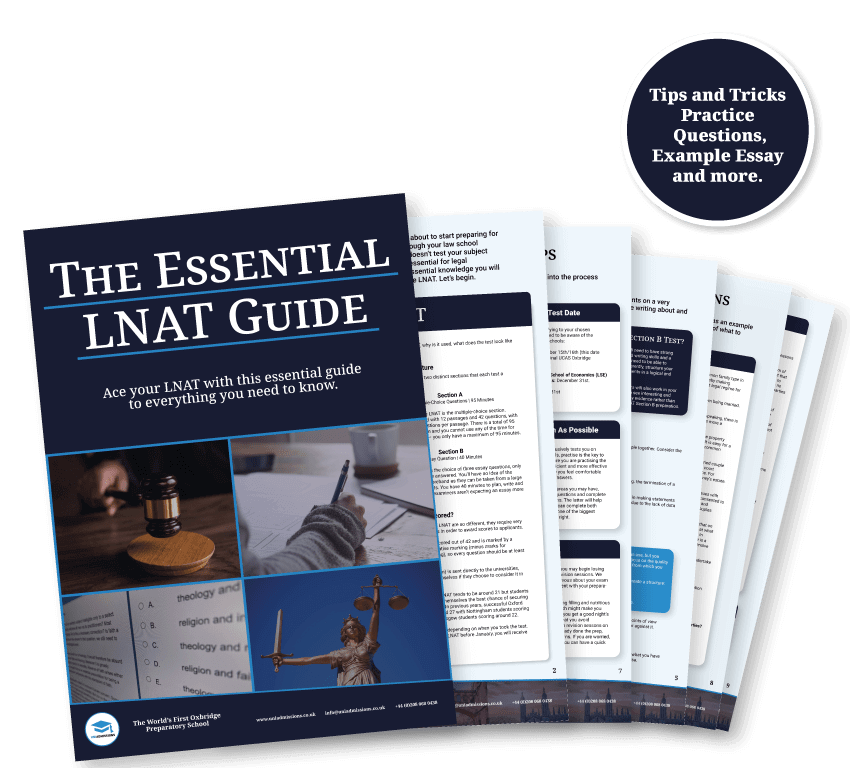There are ten LNAT universities in the UK, so do you need to sit the test?
LNAT universities use the test to see if you have the aptitude for the skills to study Law. Applicants to the prestigious LNAT universities tend to be very closely matched on paper, with the majority receiving all A – A* grades so the test helps the admissions tutors differentiate between applicants.
Read on to find out if you need to take the LNAT to study Law at the universities you are applying to.
What is the LNAT?
The Law National Aptitude Test (LNAT) is a 2 hour 15-minute undergraduate admissions test that some universities require you to take as part of your application to study Law. The LNAT is split into two sections, A and B. Section A is made up of multiple-choice questions and Section B is an essay question.
LNAT Universities in the UK
The following are LNAT universities and you must take the LNAT to apply:
| LNAT University | Course Code |
|---|---|
| University of Bristol | M100, MR11, MR12 and MR13 |
| University of Cambrige | M100 |
| Durham University | M101, M102 |
| University of Glasgow | M114, M1R7, M1R1, M121, M1R2, M122, M1R3, M1M9, M1RR, M1R4, M123, MN11, MN12, MV13, ML11, MQ13, MQ15, ML17, MV11, MV15, ML12, MR17, M100, M9R1, M9R2, M9R3, M9R4, MN19, ML13, M1L1, MQ93, MQ95, MV91, MV95, ML92 |
| King’s College London | LM21, M100, M121, M122, M190 |
| LSE | M100 |
| University of Oxford | M100, M190, M191, M192, M193, M194 |
| SOAS | M100 LLB and all other combinations including Law. M102 LLB Senior Status does not require the LNAT |
| UCL | M100, M101, M102, M141, M142, M144, M145, M146 |
If you are applying to the following non-UK universities, check with the universities if you need to sit the LNAT:
- Singapore University of Social Sciences
- IE University
Why do LNAT universities require you to take the test?
LNAT universities require their applicants to take the LNAT because it helps the admissions tutors differentiate between applicants who have similar grades. It is also helpful when applicants have different qualifications. For example, it can be hard to compare an applicant who has A-levels with applicants who have Advanced Highers, the IB or qualifications from other countries. The LNAT gives the admissions tutors more information on which to base their decision of who to give a place at the university to.
The admissions tutors at the LNAT universities will look at your LNAT score from Section A and your essay from Section B. LNAT universities use this to see if you have the aptitude and the skills to study Law rather than to assess your knowledge of the Law. However, knowledge of current affairs is helpful for writing the essay in Section B.
Claim Your FREE Essential LNAT Handbook
If you’re applying for Law at Oxbridge, then you’ll need to be prepared for the LNAT. With our Essential LNAT Guide, you can access a detailed breakdown of the exam structure, preparation tips, example questions from each section and more. Fill out the form below to gain free access right away!

Why is Section A of the LNAT used?
The purpose of Section A is to give the admissions tutors an indication of your comprehension and reasoning skills. The admissions tutors want to know that you can understand, analyse and interpret texts since these skills are essential when studying Law. In order to answer the questions correctly, you must be able to distinguish between statements of fact and opinion and focus on the detail without jumping to conclusions. It also tests your ability to select the relevant information and make logical deductions.
What are universities testing with Section B of the LNAT?
The admissions tutors read your Section B essays to see if you can put forward a convincing and balanced argument. The tutors look for applicants who are thinking outside of the box and can back up their arguments with evidence. They will assess your English skills (spelling, punctuation, and grammar) and ability to write clearly and succinctly.
What happens next with the LNAT?
There are no official cut off scores for LNAT universities so we can look at the average scores for successful candidates instead. Successful Oxford University applicants tend to score around 27, Glasgow applicants score around 22, King’s College scores around 25 and successful UCL applicants score around 26 on the LNAT. Therefore, applicants should really aim for a score of 27 or more to help secure their places at a top LNAT university.
If you achieve a good LNAT score and write a strong essay, this will help your application to study Law stand out to LNAT universities. You will receive your results depending on when you took the test. For example, if you took the LNAT before January, you will receive your results by February. However, remember that you can only take the LNAT once between September and July unless there are extenuating circumstances. Make sure you’ve got all the important LNAT dates in your calendar.
If you’re looking for in-depth advice about how to prepare for the LNAT, then our LNAT Preparation Guide is perfect for you. For complete LNAT support with guidance from expert tutors, then discover our LNAT Tuition Programme to find out how you can triple your chances of success.
Looking to boost your LNAT score?
The UniAdmissions LNAT Programme will rapidly boost your score and triple your chances of succeeding in your Law application.
Our expert tutors will guide you through past papers in mock exam scenarios so that you are well-prepared by the time your exam comes around. UniAdmissions helps students refine and hone their abilities so that they’re exam-ready on test day for all aspects of the LNAT exam.
Discover our Oxford Law Premium Programme and enrol today.







